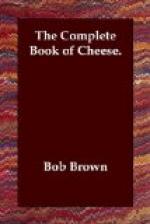While it is generally true that the bigger the cheese the better, (much the same as a magnum bottle of champagne is better than a pint), there is a limit to the obesity of a block, ball or brick of almost any kinds of cheese. When they pass a certain limit, they lack homogeneity and are not nearly so good as the smaller ones. Today a good magnum size for an exhibition Cheddar is 560 pounds; for a prize Provolone, 280 pounds; while a Swiss wheel of only 210 will draw crowds to any food-shop window.
Yet by and large it’s the monsters that get into the Cheese Hall of Fame and come down to us in song and story. For example, that four-ton Toronto affair inspired a cheese poet, James McIntyre, who doubled as the local undertaker.
We have thee, mammoth cheese,
Lying quietly at your ease;
Gently fanned by evening breeze,
Thy fair form no flies dare
seize.
All gaily dressed soon you’ll
go
To the greatest provincial
show,
To be admired by many a beau
In the city of Toronto.
May you not receive a scar
as
We have heard that Mr. Harris
Intends to send you off as
far as
The great world’s show
at Paris.
Of the youth beware of these,
For some of them might rudely
squeeze
And bite your cheek; then
song or glees
We could not sing, oh, Queen
of Cheese.
An ode to a one hundred percent American mammoth was inspired by “The Ultra-Democratic, Anti-Federalist Cheese of Cheshire.” This was in the summer of 1801 when the patriotic people of Cheshire, Massachusetts, turned out en masse to concoct a mammoth cheese on the village green for presentation to their beloved President Jefferson. The unique demonstration occurred spontaneously in jubilant commemoration of the greatest political triumph of a new country in a new century—the victory of the Democrats over the Federalists. Its collective making was heralded in Boston’s Mercury and New England Palladium, September 8, 1801:
The Mammoth Cheese
An EPICO-LYRICO ballad
From meadows rich, with clover
red,
A thousand heifers
come;
The tinkling bells the tidings
spread,
The milkmaid muffles up her
head,
And wakes the
village hum.
In shining pans the snowy
flood
Through whitened
canvas pours;
The dyeing pots of otter good
And rennet tinged with madder
blood
Are sought among
their stores.
The quivering curd, in panniers
stowed,
Is loaded on the
jade,
The stumbling beast supports
the load,
While trickling whey bedews
the road
Along the dusty
glade.
As Cairo’s slaves, to
bondage bred,
The arid deserts
roam,
Through trackless sands undaunted
tread,
With skins of water on their
head
To cheer their
masters home,




